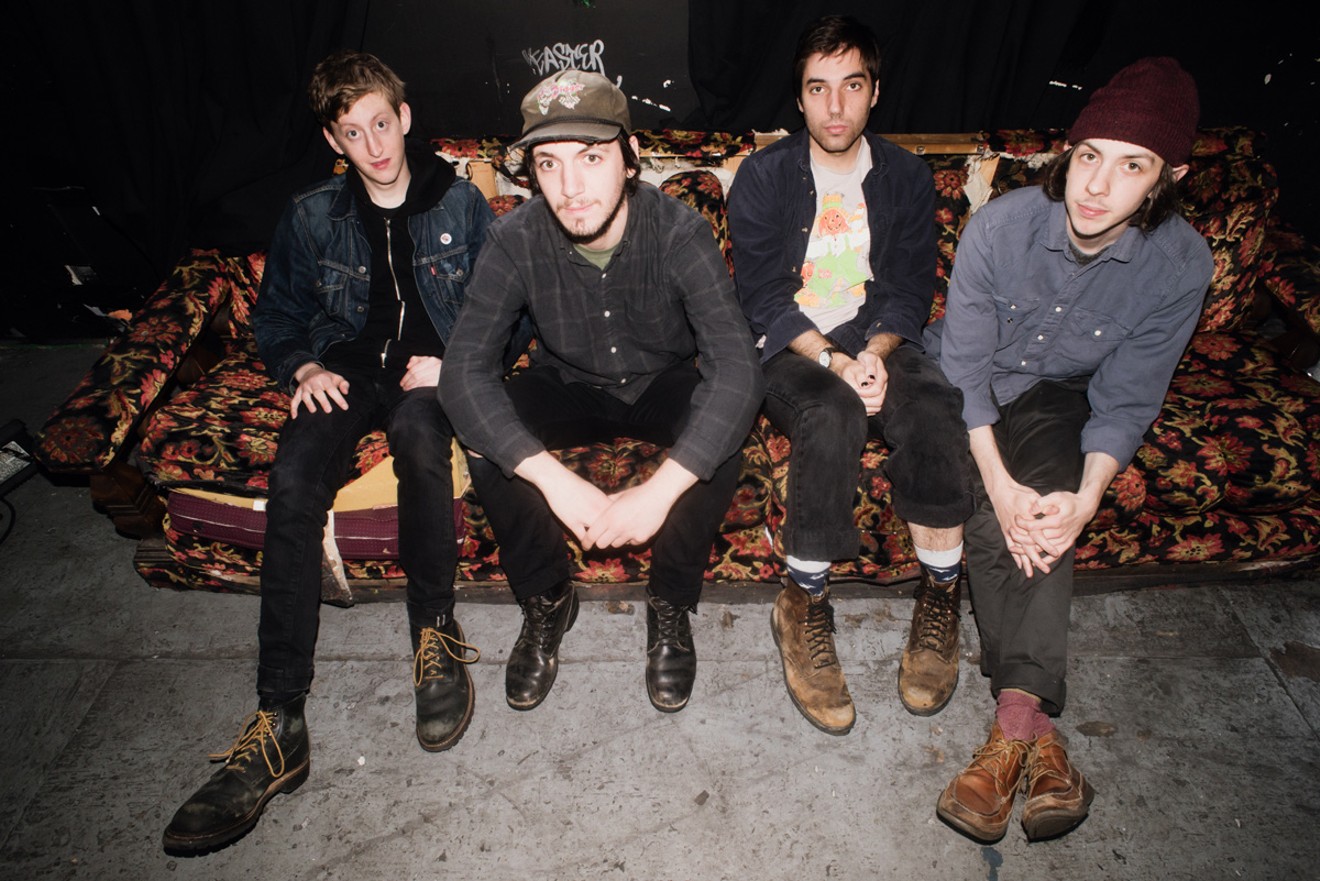LVL UP put out one of the better indie-rock records of 2016, Return to Love. It's a disarmingly moving album, imbued with warmth and introspection. Though based in New York City, the four-piece was founded at SUNY Purchase in 2011. The group started as a recording project between guitarist Mike Caridi and Dave Benton that set out to produce one split cassette release, but in the end, the two songwriters decided to put out a full album and start a new band.
Releasing its first projects on its own Double Double Whammy imprint, LVL UP soon became its members' main project. In the group's early days, the rock underground nationally was somewhat dominated by garage and neo-psychedelic rock and bands that, like LVL UP, put out cassettes. But LVL UP was more of a pop band with an interest in adding sounds into the music that harked back to late-’90s indie pop. That aspect of the band's music may not have been as obvious on its first two records, but with Return to Love, LVL UP, long out of the incubator of an insular college campus, captured ideas that spoke to a more adult experience without stultifying the music. Its fresh energy remained intact, even as the songwriting reached into those introspective and thoughtful spaces that one hears on the best indie-pop records of the ’90s and early 2000s. We spoke with LVL UP's Caridi and Nick Corbo about why they released music on cassette tapes and how ’90s indie pop impacted their sound.
Westword: Some people wonder why anyone would put out cassettes.
Mike Caridi: In the scene we're operating in, cassettes were something people would collect and listen to at their apartments or in their cars. It was a cheap alternative to putting out an analog release. So we invested a couple of hundred dollars and made a hundred cassette tapes, and we dubbed them ourselves.
Nick Corbo: When we were in the middle of college, if anyone had a car, it was probably an older car with a cassette player, so it was relevant. The cars that kids have now might not have a cassette player, so maybe it wouldn't be as much of a thing.
Your new album seemed more atmospheric, with an almost nostalgic haziness akin to The Glow Pt. 2, by Microphones.
Nick: That's tight. Thank you. I hear Neutral Milk Hotel a lot, and that's obvious and not very explorative. But, yeah, we're all big fans of that record.
“Naked in the River With the Creator” is especially reminiscent of the second half of The Glow Pt. 2 with the warm, introspective vibe.
Mike: Yeah, we're all definitely big fans of Microphones and Mount Eerie. Each of us became aware of them separately. I heard The Glow Pt. 2 in high school. My older brother showed it to me.
The term "lo-fi" has been applied to your band. Is that an aesthetic you think you subscribed to, or more just a function of what you had access to at the time you were recording?
Mike: I think it was born out of what was available to us. Everyone was figuring out what to do and didn't have amazing equipment. The new record is still kind of lo-fi, though we did it in a studio and recorded with what was available to us. So it's not really an aesthetic.
Nick: I think there are a lot of sounds on records that we like — like The Glow Pt. 2 is a very lo-fi record, and Neutral Milk Hotel records and Sparklehorse. We like those records a lot, and the sounds on them are unique, and we shot for something more unique-sounding rather than pristine-sounding.
LVL UP will be at Lost Lake Lounge with Palm and Body Meat, Thursday, March 2, at 7 p.m.; 303-296-1007, $12, 16+.
[
{
"name": "Air - MediumRectangle - Inline Content - Mobile Display Size",
"component": "12017618",
"insertPoint": "2",
"requiredCountToDisplay": "2"
},{
"name": "Editor Picks",
"component": "17242653",
"insertPoint": "4",
"requiredCountToDisplay": "1"
},{
"name": "Inline Links",
"component": "18838239",
"insertPoint": "8th",
"startingPoint": 8,
"requiredCountToDisplay": "7",
"maxInsertions": 25
},{
"name": "Air - MediumRectangle - Combo - Inline Content",
"component": "17261320",
"insertPoint": "8th",
"startingPoint": 8,
"requiredCountToDisplay": "7",
"maxInsertions": 25
},{
"name": "Inline Links",
"component": "18838239",
"insertPoint": "8th",
"startingPoint": 12,
"requiredCountToDisplay": "11",
"maxInsertions": 25
},{
"name": "Air - Leaderboard Tower - Combo - Inline Content",
"component": "17261321",
"insertPoint": "8th",
"startingPoint": 12,
"requiredCountToDisplay": "11",
"maxInsertions": 25
}
]












